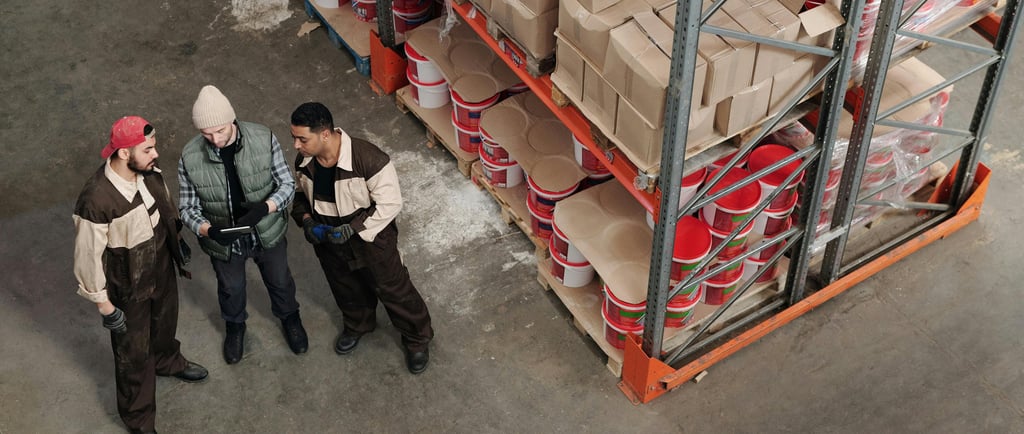Weighing Scales for the Textile Industry: Enhancing Accuracy and Efficiency
The textile industry is a diverse and fast-paced sector that demands high levels of precision and efficiency at every stage of production. From the raw materials to the finished product, accurate measurement is key to ensuring consistency, quality, and cost-effectiveness. Weighing scales are indispensable tools that help textile manufacturers maintain these standards. This blog explores the critical role of weighing scales in the textile industry, focusing on their use in fabric measurement, inventory management, quality control, and sustainability.
6/25/20255 min read


1. Precision in Fabric Measurement
One of the most important uses of weighing scales in the textile industry is for the accurate measurement of fabrics and materials. Precision weighing ensures that fabric rolls, yarns, and other raw materials are measured correctly for production.
Platform scales and tabletop balances are often used to measure the weight of fabric rolls, ensuring that the correct quantity is available for cutting and processing.
Metering scales can measure the length of fabric based on its weight, ensuring that manufacturers are using the correct amount of material for each order.
By using high-precision weighing systems, textile manufacturers can ensure accurate fabric measurement, which reduces material wastage and ensures that products are made to exact specifications.
2. Managing Yarn and Thread Weight
In the textile industry, accurate weighing of yarn and thread is critical for quality production. The weight of the yarn affects the strength, elasticity, and texture of the final product. Weighing scales help manufacturers manage yarn weight to meet product specifications.
Electronic balances are used to measure the weight of yarn spools, ensuring the correct amount of thread is used in weaving or knitting.
Count scales are often used to measure the yarn count or thread count, which directly influences the quality of the fabric.
By ensuring accurate weighing of yarn and thread, manufacturers can achieve consistency in the quality of the final textile product, preventing defects that could arise from inconsistent thread weight.
3. Supporting Fabric Cutting and Processing
Fabric cutting is one of the most crucial stages in the textile production process. Weighing scales help ensure that the correct amount of fabric is used during this process, optimizing efficiency and reducing waste.
Balance scales help ensure that fabric is cut into the correct weight or length before it is sewn or finished.
In automated cutting systems, weighing sensors are integrated to monitor the weight of the fabric being processed, ensuring precision in cutting and processing.
Weighing scales ensure that fabric is used efficiently, reducing waste and helping manufacturers keep production costs under control while maintaining high-quality output.
4. Ensuring Quality Control
Quality control is essential in the textile industry, where even slight variations in fabric weight, thread thickness, or color can lead to defects in the final product. Weighing scales are critical tools in the quality control process, helping manufacturers test the consistency and quality of materials at various stages.
Laboratory balances are used to test the weight and consistency of raw materials, ensuring they meet required standards before being used in production.
During production, weighing systems can be used to check the weight of fabrics and finished garments, ensuring they meet specifications for weight, texture, and strength.
By integrating weighing systems in quality control, manufacturers can ensure that their products consistently meet industry standards, preventing defects and ensuring customer satisfaction.
5. Inventory Management and Stock Control
Accurate inventory management is essential in the textile industry, where manufacturers need to track large quantities of fabric, yarn, and other materials. Weighing scales play an important role in maintaining accurate inventory levels, helping businesses manage stock efficiently.
Stockroom scales are used to weigh fabric rolls and other materials when they are received and stored, allowing manufacturers to track inventory accurately.
Inventory systems integrated with weighing solutions provide real-time updates on stock levels, helping managers make informed decisions about material procurement and usage.
By using weighing systems for inventory control, textile manufacturers can reduce inventory discrepancies, ensure that they always have enough materials on hand, and avoid overstocking or running out of key materials.
6. Optimizing Production Efficiency
The textile manufacturing process involves several steps, from spinning and weaving to dyeing and finishing. Weighing scales can help streamline these processes by ensuring that the correct amounts of materials are used at each stage, improving efficiency and output.
Batch weighing systems are used to measure the amount of dye or chemical treatments used during the finishing process, ensuring that the right quantities are applied.
Automated weighing systems can monitor the materials used during production, providing real-time data on material consumption and process efficiency.
By optimizing material use through accurate weighing, textile manufacturers can reduce waste, increase production speed, and maintain cost-efficiency.
7. Enhancing Sustainability and Reducing Waste
The textile industry is increasingly focused on sustainability, seeking ways to reduce waste and minimize its environmental impact. Weighing scales help manufacturers achieve their sustainability goals by ensuring that materials are used as efficiently as possible.
Precision weighing reduces material waste, ensuring that the exact amount of fabric, yarn, or dye is used in production, minimizing surplus.
Sustainable practices such as using automated weighing systems can help companies optimize material use, reduce carbon emissions, and limit environmental damage.
By integrating weighing technology into their operations, textile manufacturers can contribute to eco-friendly production practices, reducing waste and improving their overall sustainability footprint.
8. Supporting Customization and Small-Batch Production
In today’s competitive textile market, many manufacturers offer customized or small-batch production to meet the specific needs of clients. Accurate weighing systems are essential in small-batch production, where material requirements can vary significantly.
Custom-made scales can be designed to measure materials used in small batches, ensuring precision even when producing unique or limited-edition fabric runs.
Scales with high capacity and accuracy allow for the flexibility required to handle small or custom orders efficiently.
By using scalable weighing systems, textile manufacturers can support custom production without compromising on quality or precision.
9. Reducing Costs and Increasing Profit Margins
The cost of raw materials, particularly fabrics, yarns, and dyes, can be substantial for textile manufacturers. Accurate weighing systems help reduce costs by ensuring that only the necessary quantities of materials are used, minimizing waste and optimizing material consumption.
Weight-based inventory tracking ensures that resources are not over-ordered or wasted during production.
Automated systems help track usage in real-time, allowing manufacturers to monitor consumption and adjust production processes as needed.
By using accurate weighing solutions, textile manufacturers can reduce material costs, improve profit margins, and stay competitive in the global market.
10. Traceability in Textile Production
Traceability is important in ensuring that every stage of the textile production process is transparent and accountable. Weighing scales contribute to traceability by providing accurate records of material use at each stage.
Batch weighing systems help track the materials used in each batch of fabric, making it easier to identify any issues with production or quality.
Digital weighing systems can generate reports on material usage, allowing manufacturers to maintain a clear record of the entire production process.
By integrating traceable weighing systems, textile manufacturers can ensure greater accountability and transparency in their production operations.
Conclusion
Weighing scales are an indispensable part of the textile industry, helping manufacturers achieve precision, efficiency, quality control, and sustainability. From fabric measurement and inventory management to production optimization and cost reduction, weighing systems provide the foundation for high-quality textile manufacturing. By investing in accurate and efficient weighing solutions, textile manufacturers can improve their processes, reduce waste, and stay competitive in a rapidly evolving market.
At Shree Shree Weighing Solutions, we offer a wide range of weighing scales tailored to the needs of the textile industry. Whether you’re managing raw materials, controlling quality, or optimizing production efficiency, our high-precision weighing systems can help you achieve your goals.
Need Reliable Weighing Scales for the Textile Industry?
📞 Contact us today for advanced weighing solutions in the textile industry.
📍 Visit our Ahmedabad showroom, or schedule a demo at your textile facility across Gujarat.
